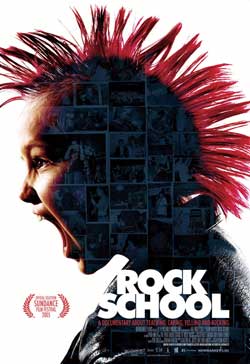 You may see posters and ads for Rock School and think to yourself, "Wait, I’ve seen that movie."
You may see posters and ads for Rock School and think to yourself, "Wait, I’ve seen that movie."
Wrong. Rock School is a fantastic and funny documentary about The Paul Green School of Rock Music, a school that teaches kids from 8-18 how to play rock music – and real rock, like Led Zeppelin and Black Sabbath, not Creed and Silverchair. The kids put on real concerts using the skills they learn, and some of Paul Green’s students are incredible – in fact a number of them were invited to Germany to perform at an annual Frank Zappa tribute festival, which is the climax of the film.
The documentary focuses on a couple of kids, including CJ, a 12 year old guitar prodigy who came to the New York City press day for the film, held at the NYC Paul Green School of Rock Music branch. Also there that day was director Don Argott, producer Sheena M Joyce and Paul Green himself. Everybody was loose and funny and we ended up going long past the scheduled time – and I ended up with a sweet School of Rock Music t-shirt ("Saving Rock Music One Kid At A Time").
For more info on The Paul Green School of Rock Music (which predates the Jack Black movie), visit the website here.
Rock School is getting a fairly wide release this weekend. To see where it’s playing near you, visit the official movie site here.
Q: Don, how did you come into contact with Rock School?
Don: At the time there was only one school, in Philadelphia, that was the only school. The way he advertised the school was with these bright posters. There’s a local Philly artist who did all the posters and they were all vibrant, and rock based. There was this one in particular that kept catching my eye: Paul Green’s School of Rock Does the Who. I wondered what the hell is the Paul Green School of Rock, so I decided on a whim one day to call and find out about it because it sounded like it might make a good film, even though I knew nothing about the school. I ended up getting in touch with Paul soon after that. They were doing a Zappa show that particular night that I called and he said I should come check it out, so I did. It was couple of songs in and it was this kid here, wearing a tie, with a guitar bigger than he was, playing a solo he shouldn’t have been able to play and I thought, “Duh, this seems like a good idea for a documentary.”
Sheena: Don had a production company with another partner for seven years and then that partnership split up.
Paul: Is that partner going to come out of the woodwork and claim ownership over the movie?
Sheena: Not so much. He was looking to be creative and do some projects. Don and I are also a couple, and when we decided not to move to Los Angeles and keep the company here, I wanted to support him in whatever creative endeavor – he had started like 16 different projects. One day he called me at my old job and said, “Don’t kill me! I think we’re going to do a documentary – we have to go see this band tonight.” I thought, “Oh Christ,” and like Don said we went to see Zappa that night and three songs in, CJ was on stage and I said, “Sold!” Three weeks later I quit my job and two years later here we are.
Q: When you decided to do this were you aware of how much time it would take to get your story?
Don: No. I had been involved in a couple of documentaries before that kind of didn’t go anywhere because of the subject or whatever. It was one of those things where very little thinking went into it. It seemed like a great idea, and then when I met Paul it seemed like it was all going to work out. We just showed up with a camera four days after the initial courtship and we were there for nine months. It was just something we did and it started to get bigger and bigger as we were shooting because the Germany thing cropped up –
Sheena: Suddenly you have 120 hours of footage. You’re doing this at night and on the weekends and you’re putting everything you have on the line. Then you have all this material and how will you edit it and will we have a story? It took us a year to edit it.
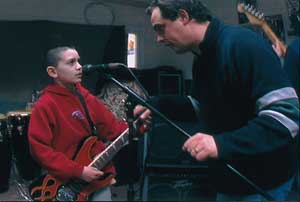 Q: But you were lucky that it only took nine months to shoot.
Q: But you were lucky that it only took nine months to shoot.
Don: It was a very short amount of time to shoot a documentary. We were lucky that the Germany thing did happen, otherwise we might still be – it might have been like Hoop Dreams, seven years in the making of the school.
Q: Paul, how did you go from teaching guitar to taking everything you know about rock and institutionalizing it?
Paul: I was teaching out of my living room and then this great movie with Jack Black came out! I thought – what a great idea. I should try that!
No, sorry [for the record: The Paul Green School of Rock Music existed long before School of Rock the Jack Black movie]. Like many great ideas it came by accident. I started teaching in my living room and it turned out I had a real affinity for it, a real enjoyment and real connection with my students. One Saturday I had my advanced students come to my band’s practice spot, which was in a broken down old building, and hid the bongs and threw the beer bottles away, and I had the kids jam. They were godawful. They really just stunk. I was like, “What’s wrong with you guys? I thought I was teaching you well! Let’s do this every Saturday.”
So Saturdays these little things we called Rock School started up. And it was nice that I could charge the students for an extra lesson each month. Actually I started charging tuition each month instead of per lesson, so that if they missed one they had all these Rock Schools to make up. We were doing it for a while and I started to notice that the kids I was bringing were getting really good. I was amazed at what a little bit of rehearsal and practice could do.
My friend was having an art opening in November of 98 and he said, “Why don’t you have your kids play?” We started getting ready for the show and I could see the enthusiasm from having an end point to work towards. To use a sports analogy it’s like the opposite of shooting hoops in the abstract. He called me a week before the show and said he was making fliers and what should he call the thing. I would have used Rock School but there was a Herbie Hancock TV show of that name, and at the time I was a very minor local celebrity and people would know my name because I had played in bands. So I said to him, “The Paul Green School of Rock Music,” thinking it was a one off thing. I wouldn’t have chosen such a self-serving name for nine branches across the country. I guess I’m like Arthur Murray. Or Tiger Schulman.
So yeah, we did The Paul Green School of Rock Music and our current logo was on that flier, the little guy playing guitar. Music was an important part of that – I wanted it to be clear that it was rock music, not just rock. 150 people showed up and Philly Magazine did this big spread on us and I had a waiting list and a year and a half later we opened a school. I took out a lease, maxed out my credit cards and went for it.
Q: Do you own the building?
Paul: No. Actually we have to move out of the building from the movie because we’re right in the footstep of the convention center project.
Q: That’s a shame. It was such a perfect building because it had no neighbors, it was isolated.
Paul: It was amazing. And yeah, they didn’t even do background checks on me, they just let us come in. The convention center was something that should have happened in 2002 and they rented it to me with no credit check because I was only supposed to be there a year. And here we are at this crazy fixed rate of rent five years later.
Q: Did you have a staff when you moved in?
Paul: Once we got into the building I hired a drum teacher and we started the steady growth – 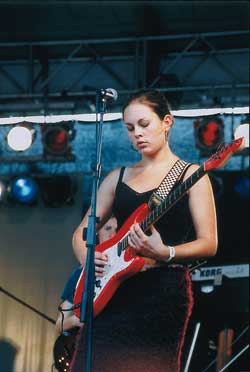 we went from 20 [kids] to 60 to 120 and now we have a thousand students at nine different locations.
we went from 20 [kids] to 60 to 120 and now we have a thousand students at nine different locations.
Q: Nine locations where?
Paul: San Francisco, Salt Lake City, Philadelphia, New York and five suburban locations. Four around Philly and one around New York.
Q: Are you still teaching or do you spend your time administrating?
Paul: We actually hired a CEO, for lack of a better term, to administrate. My guarantee to myself and my school and my partners is that three days a week I’ll be in with kids. I don’t do individual lessons anymore, that gets a little weird. I’m still running shows – we just did our first one in New York. We did Pink Floyd’s The Wall, which is our tradition, and because it’s New York, Bob Ezrin showed up. He was a friend of a friend of one of the parents – that’s how it is with New York people – and he comes up and shakes my hand and says, “I’m Bob Ezrin.” At the intermission of the show he had tears in his eyes!
Q: CJ, what kind of music were you listening to before you started at the school? Were you into Zappa and Santana?
CJ: Some of those bands I had just kind of heard of, like Pink Floyd and Led Zeppelin. I had never heard of Zappa before I entered the school. I had heard of Santana, but I had never listened to it. I was listening to more punk and nu-metal type stuff.
Q: Who was your favorite band?
Paul: 311.
CJ: No, it wasn’t 311.
Paul: Coalchamber?
CJ: No, it wasn’t Coalchamber. Blink 182 used to be one of them, I think.
Q: Who are your favorites today?
CJ: Today it’s Pink Floyd. I just started getting into neoclassical metal, Yngwie Malmsteen. Joe Satriani. He’s not neoclassical, but he’s the same kind of virtuoso genre.
Q: Steve Vai?
CJ: I am actually going to start getting into him.
Sheena: One at a time! Give him a break.
Q: Paul, does it ever make you want to form a band again?
Paul: God, no. I still jam all the time and play with the kids and we have a great staff and I play with them. It’s fun.
Q: Paul, this film is a pretty unfiltered look at you. Do you think it’s fair?
Paul: Don screwed me. I thought it was going to be a Lifetime Channel style –
Don: He thought it would be mostly concert footage!
Paul: So Don took the two or three times I lost my temper over nine months and stretched them out. What are you going to do?
Q: Don, how much do you think he was playing up to the camera?
Don: I don’t think he was playing up to the camera. It’s funny because I got to know Paul and his teaching style through shooting. I wondered if he was playing to the camera, but times I would go there without a camera he would be the same way. And then I would be like, “Fuck, I don’t have a camera!”
Q: Paul, has your persona scared away parents who were interested in enrolling their students at your school?
Paul: Oddly enough, not really. The first time we saw the movie we saw it with seven parents in LA and they were like, “Oh, that’s Paul.” I’m the same whether the parents are there or not. It’s always been leniency that’s gotten me in trouble with parents, never strictness or pushing their kids too much. The drill sergeant they like.
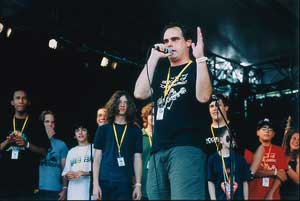 Q: What’s happened to Will since he left Rock School?
Q: What’s happened to Will since he left Rock School?
Paul: That’s a good question.
Don: Will was somebody who I think we were lucky enough to get him at the time we got him. Because it happened so quickly I really relied on Paul to get us the students that he thought would be compelling.
Will, the first day I met him I asked him to go to the basement for an interview. He’s all mopey, we went down there –
Paul: You turned the camera on and Will says…
Don: I said, tell me your name and a little bit about yourself. And he said, “I’m Will O’Connor, I was born Cesarean, my head was too big for my mother’s uterus.” And I was like, “Thank you God!” That was fucking gold.
Sheena: At that point I hadn’t quit my job yet –
Paul: And Don told you to quit your job, you had a winner!
Sheena: No, Paul would come home at the end of the day and show me footage. He came running home and told me to stop what I was doing, I had to see what he got.
Don: I felt like with Will we got a bit of an evolution. The initial idea that I had for the film was that I was going to follow a season of the shows and rehearsals. On week one they would suck and at week 12 they would be onstage and amazing. The problem is that they get incrementally better but it’s borne of years of work to get to that level. My initial idea was to follow these kids as they grew and it didn’t happen like that. But I did get Will, who went through a transformation from the first day I interviewed him.
Sheena: You can see it in the film. By the end of the film he looks right at you, he’s more animated.
Q: Do you feel like you failed Will as a teacher since he dropped out?
Paul: Will’s my biggest success. Are you kidding? He was some mopey little jerk when I got him, we had our battles, but I listened to Will. Will would just spout things off and unlike everyone else in his life I would listen and say, “That’s funny, I read that book and that’s not at all what it says, Will.” It showed him that there are positive ways to get attention and he didn’t even have to fight for it. He just had to earn it.
Q: So has he seen the movie?
Paul: No.
Q: Has he not had an interest?
Sheena: Every couple of weeks or so we’ll get a call from him: “I’m really concerned, you didn’t put this in there, you didn’t put that in there?” We keep inviting him over – come over to watch it with us! Everything’s OK! He’ll say, “Let me look at my schedule and I’ll call you next week and we’ll set up a time.” Then I never hear from him. And four weeks later I get a call from him: “You didn’t put that thing in there, did you? I’m getting really nervous.” Will! Just fucking come in!
Don: But he is going to school. He was applying to schools and I think he got in. What I was trying to do with Madi, who I was most nervous about because of comments like where Paul says, “I’ll punch your mom in the face for 6.75 an hour” –
Paul: [laughs]
Don: –which I think is fucking hysterical, but like –
Paul: It’s a non sequiter too. What came before that doesn’t justify it, but it explains it.
Q: Did the people behind School of Rock ever contact you in any way?
Paul: Nope.
Q: They just stole your idea? Have you ever spoken to Jack Black?
Paul: No.
Q: What would you say to Jack Black?
Paul: I’d challenge him to a guitar duel.
Q: That’s a great special feature for the DVD. You have to set that up. Who would win?
Paul: Well, one of us is a guitar player and one of us is an actor.
Don: I want to shoot that.
Sheena: He’d never do it!
Paul: He’d never go for it.
Q: How do you know?
Paul: He’s a chicken.
Q: Paul, were you surprised by some of the things the students were saying in their interviews about you?
Paul: The only one who was even critical really was Will, and he’s just Will. You know what I mean? Ask him about ice cream and he’d be like, “Well you know, it’s too cold and hurts my teeth.” [laughs hysterically] “Sex makes me all sweaty.”
Nah. I was touched by some of it. Everything I needed to know about the movie I knew when we saw it at the LA Film Festival and people laughed at things I didn’t think they would laugh at and no one punched me in the stomach afterwards. I have now seen it with five different audiences and no one punched me.
Don: The best was at the South by Southwest screening when they knew Paul was in the audience. He went up for the Q&A and got a standing ovation. I think that speaks to the fact that we did a good enough job as filmmakers to show him. We tried to show that – it’s easy in this form when you’re editing things, we could have made people hate Paul in the first five minutes.
Sheena: We left out just as many good things as we did things that could be construed the worst way. There are moments when Paul is being the best guy ever, but there’s some kid who’s revealing very personal stuff about her home life and that’s not something we want to bring out to the world. We tried really hard so that if Paul looks like a dick in one scene, he has to be cool in the next. But love him or hate him, you can’t argue with results.
Paul: What was the dickiest thing I did in the movie?
Q: The dickiest? Well, I was fascinated by the relationship between you and Madi and her dad, who is a teacher at the school and is there when you’re ragging her for her religion.
Paul: It’s not a religion!
Don: [laughs]
Paul: That’s the whole point! First of all, Quaker is not a religion, it’s a loose set of stupid ideas. At least for Madi it was.
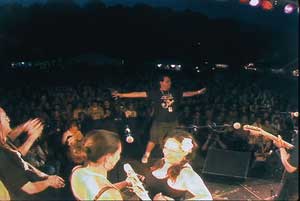 Sheena: Madi was a student before her dad became a teacher and what she said to him was, “You can’t get into my shit. If you’re going to teach here you can’t treat me like your daughter.”
Sheena: Madi was a student before her dad became a teacher and what she said to him was, “You can’t get into my shit. If you’re going to teach here you can’t treat me like your daughter.”
Paul: And I wasn’t ragging on her religion. She was missing my rehearsals for Friendly Gangsta shows! [The Friendly Gangstas are, believe it or not, a Quaker rap group. You have to see this movie just for that] If I ever did anything in my life – if I did nothing but make the Friendly Gangstas uncool in her mind, I did a lot.
With Madi it was just like the same thing as Will. I would say, “What is Quakerism?” She would say “It’s the position that there is no truth, we are all just searching for answers.” I would say, “Well that’s a truth. Quakerism is a religion with one truth, it’s own?” That’s the way I would rag on her religion, in a very thoughtful, philosophical way, I wasn’t just saying “Nanny, nanny Quaker!”
Sheena: Well, you would do that too.
Paul: Then I would punch her friends in the stomach to see if they would punch me back! [laughs]
Q: When you saw yourself in this movie what did you learn about yourself?
Paul: I noticed I have a bald spot in the back of my head. Don loved that bald spot. Of all the scenes in the movies there’s only one that bothers me, and it’s when I’m leaning on this hand truck talking to this girl and it seems like I’m really laying it on thick. It’s a goth girl and I’m telling her why she’s not making all-stars. It seemed a little thick to lay it on. For all the other scenes I always remember what immediately preceded it.
Q: Would you continue to film the school?
Paul: This movie is sort of this movie and I wouldn’t want to do this movie again. If the camera didn’t affect the proceedings – but of course they did, Heisenberg and all that – but from here on in they certainly would, I think people would be so self conscious because of the movie.
Q: So you wouldn’t do a School of Rock: The Reality Show?
Paul: No. I mean, for a lot of money.
Q: CJ, has a lot changed since the film?
CJ: For me, yeah. I’ve grown long hair. My influences in music have changed a bit. I’m working a bit harder at school.
Don: The film’s not out yet. I think it will be interesting to see, for all the kids that are featured in it and the school in general, there’s going to be a lot of attention for a relatively short amount of time.
Sheena: Well, back to CJ one thing he can talk about is playing with Alice Cooper and Marky Ramone.
Don: There’s a soundtrack that accompanies the film, and once we got picked up there were a bunch of ideas for the soundtrack and Paul didn’t like any of them until we had this one of the kids playing with actual rock stars. At Sundance they got Alice Cooper to play at the party we did out there and we shot it and it’s the new end credits.
Q: What song?
Don: School’s Out of course.
Q: CJ, are you better at guitar than Paul is?
CJ: Not quite yet.
Q: Maybe we should do a duel.
Paul: Chop for chop, CJ’s got great chops. But he can’t beat my depth of knowledge, and I can pull stuff out of my ass that still makes CJ go [quizzical look]. But CJ does the right thing – he looks at my fingers and goes home and practices.
Q: Paul, is there an aspect of rock music that can’t be taught?
Paul: Of course. That’s why we don’t mess with original music. People ask why we don’t have the kids write original music and there’s like five answers there, but I don’t want to mess with their original music. I don’t want to teach songwriting. That’s a very personal thing. I want to teach chords and scales and preparation and work ethic and those sorts of things.
Some of my franchises they get into staging the kids doing rock poses and I hate that. It looks corny. I yell at them when they do it. They say to me, “But your kids just stand around.” Yeah, but they mean to stand around. CJ has learned to move around onstage on his own and rock out.
Q: CJ, looking at yourself in the film, do you see improvement?
CJ: Yeah, there’s a huge level of improvement over the course of two years. There has been a lot of improvement and watching that I know what I can improve on. I see things that I think stink.
Paul: But sometimes you don’t want to get rid of that. You want to have that. Sometimes we get bored of our own playing, which is one of the worst things that can happen.
Q: Do you have a band right now CJ?
CJ: Yeah, it’s called Mach 6, we’re just getting stuff together and getting tight so we can do gigs.
Q: In the movie you’re kind of frighteningly good. Is it tough to find other people to play with? Or are you doing the Van Halen thing and making the band your own.
CJ: I can jam with people.
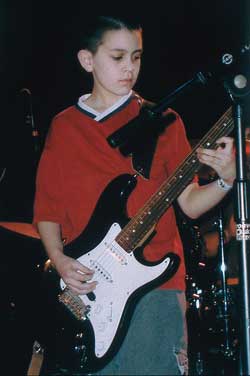 Don: Paul rags on us about this aspect of it, but fuck it, it’s our film and we do what we want, but you can’t show the whole school. There were older kids in there who were better than CJ as far as technical ability.
Don: Paul rags on us about this aspect of it, but fuck it, it’s our film and we do what we want, but you can’t show the whole school. There were older kids in there who were better than CJ as far as technical ability.
Paul: CJ was chosen because he had the best chops to size ratio. But honestly our school is filled with kids who are really amazing. But since he’s a little younger than them – he’s actually found at one of our other schools kids around his age who are phenomenonally good.
Don: When you look older and you play good it’s not that impressive. You should be good, you’re 18 years old! But a 12 year old playing well beyond his years, that’s what we focused on.
Paul: Like Madi was one of three great vocalists in the school at the time but we chose her because the other two I was too close to and it would be all scenes of like, “Lemonade? Yes please! Thank you!”
You ever see that Itchy & Scratchy when Marge takes over and they’re nice to each other? I didn’t think it would have the same dramatic element that me and Madi would.
Q: It must have been tough for you to make those decisions.
Paul: It was so easy. We were doing four shows that season and I said let’s pick two kids from each show. Two shows and four kids ended up in the movie, but I went right through and made a list.
Sheena: It was tougher for us.
Paul: Then some kids couldn’t do it – there was this goth girl but her family wouldn’t give us the access we needed. Then there was this girl who was shy and her family was maybe too weird for the movie. But it was really easy. Most of my kids are just good musicians.
Don: It took you four minutes to give us a list.
Sheena: It was hard for us because we didn’t want to disappoint the kids.
Don: People let you in their homes but when you’re in the editing room you have to cut them because they’re not compelling enough. It’s tough.
Sheena: One of the moms just would say, “There’s crazy Uncle Don with the camera again.” We’d attend family events – one thing that was great for us is that we became a part of these kids lives and we were embraced by these families.
Q: Paul, is it hard when the kids come into the school now, these 12 or 13 year olds, is it hard to get them to want to play Zeppelin and Sabbath and not the popular modern stuff?
Paul: We have it down to such a science. That’s just the way it is. But you’d be surprised, that stuff is more popular than you would think. Then again, when I went to Penn I didn’t say, “Let’s study more popular philosophers, why don’t we read The Philosophy of the Matrix instead.” No, we read Plato and Descartes, and that’s what we do here.
CJ, has there ever been a kid who did the Zappa show who didn’t end up loving Zappa?
CJ: I don’t think so.
Sheena: But it wasn’t off the bat –
Paul: No, it took time, but when we got to Zappanalle, they all stood there and watched 20 Zappa cover bands.
Q: What are other musicians that you want them to learn?
Paul: Led Zeppelin and Sabbath are the base, and the Stones of course. We do punk rock. We do some modern stuff like Radiohead. We actually did Jesus Christ Superstar. I hate the Beatles, but we’ll do the Beatles. I see the value in it, but I never listen to them.
Q: Has seeing the film changed your approach to the school?
Paul: It’s just spurred me on. Seeing the kid’s faces after a performance, there’s nothing else like that.
Q: CJ, who’s the ultimate guy you’d like to play with?
CJ: King Diamond. That’s a high priority!